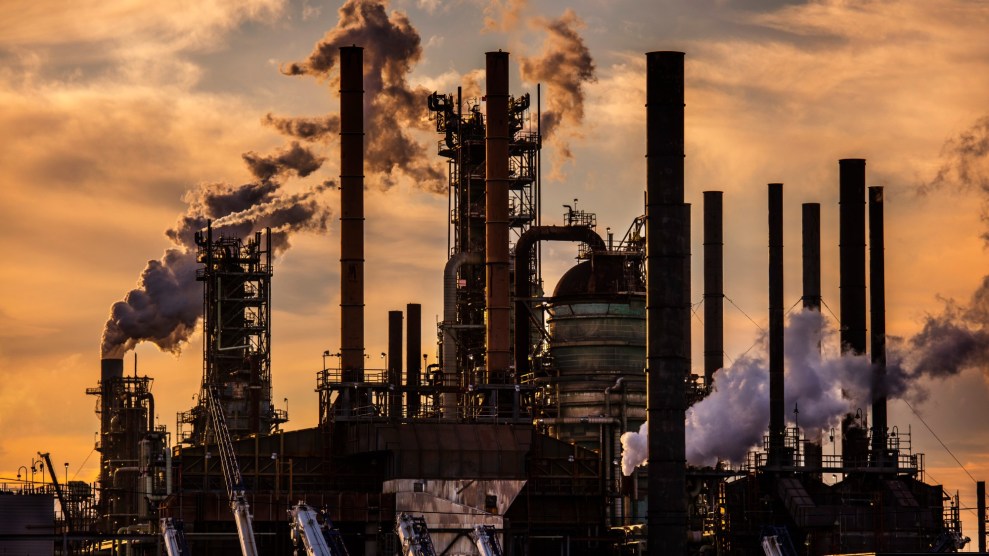
An ExxonMobil refinery in Baton Rouge, Louisiana.Barry Lewis/InPictures/Getty
This story was originally published by The Guardian and is reproduced here as part of the Climate Desk collaboration.
Some of the world’s biggest fossil fuel companies have used advertising to “greenwash” their ongoing contribution to the climate crisis, according to files published by the environmental lawyers ClientEarth. They describe the practice as “a great deception.”
The files compare the adverts produced by ExxonMobil, Aramco, Chevron, Shell, Equinor and others with the companies’ operations and products, overall climate impact and progress toward climate-safe business models.
ClientEarth is calling on policymakers to ban all fossil fuel company ads unless they come with tobacco-style health warnings about the risks of global heating to people and the planet. Its lawyers lodged a complaint in 2019 alleging that BP’s advertising campaigns had misled the public by focusing on the company’s low carbon energy products, when more than 96% of its annual spend was on oil and gas. BP withdrew the ads before the complaint was assessed. ClientEarth said it was now putting other fossil fuel companies on notice over greenwashing adverts.
“We’re currently witnessing a great deception, where the companies most responsible for catastrophically heating the planet are spending millions on advertising campaigns about how their business plans are focused on sustainability,” said Johnny White, one of ClientEarth’s lawyers.
“We need to reduce reliance on fossil fuels, but instead of leading a low-carbon transition these companies are putting out advertising which distracts the public and launders their image. Our research shows these adverts are misrepresenting the true nature of companies’ businesses, of their contribution to climate change, and of their transition plans.”
ClientEarth’s analysis includes claims that:
- ExxonMobil advertising suggested its experimental algae biofuels could one day reduce transport emissions, while it has no company-wide net zero target and its 2025 emission reduction targets do not include the vast majority of emissions resulting from its products.
- Saudi Arabia’s Aramco said it conducted business “in a way that addresses the climate challenge” yet it is the world’s largest corporate greenhouse gas emitter and plans to continue exploring for more oil and gas, despite having reserves greater than those of Exxon, Chevron, Shell, BP and Total combined.
- Chevron said it was “part of the solution” to climate change but does not have a net zero commitment or a strategy aligned with the Paris climate agreement. Its plans for carbon capture and storage cover less than 1 percent of its 2019 carbon emissions.
- Shell said it was investing in “lower-carbon biofuels and hydrogen, electric vehicle charging, solar and wind power”, but in 2020 it earmarked between $2bn and $3bn a year for low-carbon businesses, compared to $17bn on fossil fuels operations.
- Norway’s Equinor has talked of growing renewable capacity tenfold by 2026, but renewables are only planned to be 4 percent of its energy by that date.
ClientEarth said warnings on oil company adverts should state that fossil fuel products are the main cause of global heating and that companies must divulge how much they are spending on fossil fuels compared with their low-carbon businesses.
There are numerous campaigns in Europe and North America to ban fossil fuel advertising. The French parliament proposed a law in February to ban ads for fossil fuel products, and a Dutch law professor published a paper arguing that fossil fuel advertising is inherently harmful and misleading and should be banned.
A Shell spokesperson said: “Our target is to become a net-zero emissions energy business by 2050, in step with society’s progress towards the goal of the Paris agreement on climate change. Our short, medium and long term intensity and absolute targets are fully consistent with the more ambitious 1.5C goal of the Paris agreement. And our targets cover the full range of our own emissions and our customers emissions.”
A Chevron spokesman rejected ClientEarth’s analysis. He said: “We engage in honest conversations about the energy transition. We believe the future of energy is lower carbon and are working to help the world achieve that goal. We are taking action to reduce the carbon intensity of our operations and assets, increase the use of renewables and offsets and invest in low-carbon technologies.”
ExxonMobil, Aramco and Equinor did not respond to a request for comment.
The Guardian announced in January 2020 that it would no longer accept advertising from oil and gas companies.
















